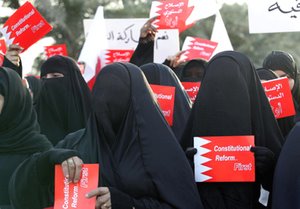
We Infidels, eventually, are going to come over there and set your women free. They'll be able to do whatever they want to do, including choose not to marry your fascist ass.
For now, women in Bahrain are demonstrating and campaigning to throw off the shackles of Sharia (thanks to Islamic Evil blog):
Bahraini women are battling a male-dominated society and powerful Islamists in their quest for reforms that would shift jurisdiction over family and women's affairs from Islamic to civil courts.
Majida, 32, whose 12-year marriage was annulled, was deprived of her children and sent back to her family home following a decision by an Islamic court.
In the absence of a personal status law in Bahrain, sharia (Islamic law), in both its Sunni and Shiite interpretations, is the only arbiter when it comes to marriage, divorce, child custody and inheritance.
But after years of struggle, Bahraini women have finally found an influential supporter.
The first lady of the Muslim island kingdom, Sheikha Sabika al-Khalifa, who chairs the supreme women's council, has sponsored a bill for a personal status law that would still be based on the sharia.
It faces fierce resistance from the religious establishment, particularly among Shiite clerics, who have recently brought thousands of people on to the streets to protest against the proposed law.
Bahrain is a tiny archipelago of 35 islands off the eastern coast of Saudi Arabia. It has a population of 650,000, the majority of whom are Shiite Muslims.
It is ruled by the Sunni Al-Khalifa dynasty and it is considered progressive and open-minded when it comes to women's rights compared with other Gulf countries, especially Saudi Arabia, where sharia is the supreme law of the land.
"It is inconceivable that in the 21st century there is a country that does not have a personal status law," activist Ghada Jamshir said.
"The clerics are opposed to the law because it limits their powers. They would be overridden by legislation and would no longer be able to issue verdicts according to their whims."
Jamshir heads a women's committee lobbying for the law and was charged last May with publicly defaming the Islamic judiciary by distributing pamphlets and of insulting a judge during a telephone conversation and in court.
She was acquitted of the charges on December 28.
Afaf al-Jamri, a Shiite activist who is a member of the main Islamic National Accord Association opposition party, supports the proposed law.
"This code is a necessity and a fundamental demand for women," she said.
"The situation of many Bahraini women is tragic. Each neighbourhood has an average of four women that were thrown on the street by their husbands after, say, 30 years of marriage just because they wanted to have younger wives."
A man is allowed four wives according to sharia.
Jamri highlights the plight of many women when it comes to monthly alimony.
"Judges delay cases for years and years leaving many women without alimony. And then after years of suffering they receive 30 dinars (11 dollars) per child," she said.
A government fund was created recently to help women awaiting Islamic court decisions on alimony, according to another activist Mariam al-Ruwei, who is in favour of the family law.
And according to an amendment to property laws, couples also have the option to jointly own their matrimonial house, which according to Bahraini tradition must be in the man's name.
Activists initially pushed for a family law that would unite both Sunni and Shiite strands of Islam.
But Bahrain's traditionally combative Shiite religious and community leaders protested, demanding that their sect's particularities when it comes to family issues be reflected in the law.
Even after this was done, Shiites demanded that the family law be enshrined in the country's constitution making any future changes or amendments difficult.
"Amending the constitution is a red line," Jamri said.
Bahrain's main Shiite party and three other opposition groups boycotted the 2002 elections, demanding that legislative powers be confined to the elected house of parliament and not shared with a council, whose members are nominated by the king.
"We want a united family law because we belong to the same religion: Islam," Jamshir said.
"I do not want to see my Shiite sisters continue to suffer."
She cites the fact that Shiite divorced mothers lose custody of their sons at the age of seven and that of their daughters at nine, while Sunni mothers get custody of their daughters until they are married and sons until the age of majority.
No comments:
Post a Comment